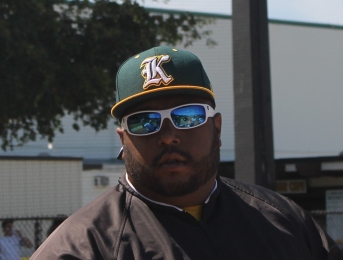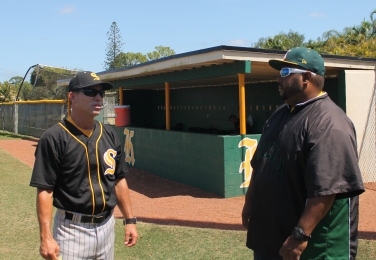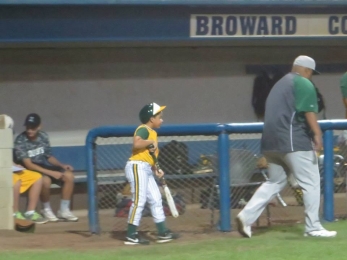Sunday Morning Chat Part I: Killian’s Angel Herrera
 This week HSBN Senior Writer Rick Duteau sat down with Killian Manager Angel Herrera, whose Cougars are currently atop the Miami-Dade Power Rankings. Herrera shares his thoughts on baseball, the path that brought him to Killian and getting his guys to understand the true values that matter in life.
This week HSBN Senior Writer Rick Duteau sat down with Killian Manager Angel Herrera, whose Cougars are currently atop the Miami-Dade Power Rankings. Herrera shares his thoughts on baseball, the path that brought him to Killian and getting his guys to understand the true values that matter in life.
Rick: Well, Coach Herrera, let’s start by giving our readers a little background into your career.
Coach Herrera: Well, I graduated from Southwest High School in 1996. I was the first baseman there. I left there and played college baseball at Hardin-Simmons University, then Trinity International University. I came home in 2000. I played my last year at Trinity here in 1999-2000. I was a two time all conference player, South Regional Player of the Year, and First Team All American. When I finished, I had a couple of workouts set up. Actually one workout I attended was back at Texas but I was less than a year away from getting my degree and I met my wife, who was my girlfriend at the time, and I had known I was going to marry her. And I decided to hang it up and do what I always wanted to do, which was coach. I knew I wanted to coach since I was a junior in high school. So I said, you know what, let me focus on getting my degree and getting married and trying to start my family and my coaching career.
Rick: It’s almost like starting two families at once.
Coach Herrera: That’s right. That’s exactly right.
Rick: And I know you’re a family man. I’m pretty sure I’ve seen the little one, maybe the wife around the baseball field with you. Tell me, how many kids now? How long have you been with your wife?
Coach Herrera: I’ve been with my beautiful wife for fourteen years. We just had our ten-year anniversary. We dated for four and then we got married.
Rick: Oh, congrats.
Coach Herrera: Thank you. We just had our ten-year anniversary in November. I have one boy. I have a son who is my pride and joy. His name is Angel as well; he’s eight. He’s our batboy.
Rick: I was going to say, he’s your batboy. I remember seeing him in the pre-season; I remember seeing him at the game when you played Flanagan.
Coach Herrera: Yes, yes, he’s my batboy. He’s a dream come true. I always wanted to coach, like I said, professionally. That’s what I wanted to do as a career. But I always dreamed of having a son. My son is a tremendous blessing. And my wife, she’s my best friend. She’s the lifeblood of my life. She’s the one that makes everything possible for me to do everything that I do. If it wasn’t for her I wouldn’t be where I am. I’m truly blessed.
Rick: Behind all great coaches there’s usually a wife like that at home supporting them and keeping them going the right way.
Coach Herrera: Absolutely.
Rick: Your teams are always among the best in Miami. What is that you and your coaches do that creates a winning atmosphere for the players to thrive in?
Coach Herrera: We’re big on mindset. We’re big on molding character; molding personalities; maturing on and off the field. And off the field just as much, if not more, because it takes a certain mindset to buy into a program; to consistently work and pursue a goal; pursue improvement; pursue work ethic; pursue greatness; pursue success. So we start by identifying a certain type of young man, a certain type of player and then go from there. Consistency. Trying to teach them values off the field through this great game along the way. We usually find that, if we can get that type of young man, regardless of where he’s at, he’s got to have talent. Let’s call it what it is. You need to be able to play. But if you can take a young man with that type of talent that’s coachable, that buys into that, as he matures as a young man, as he matures in all those other intangibles, he usually matures as a baseball player. By the time he’s a junior or senior, he excels and he helps us win ball games. So that’s kinda been the formula that we use, that’s worked for us and that’s something that I truly believe in.
Rick: Remind me again, you said 2000. Have you been with Killian since then? How long have you been the coach here?
Coach Herrera: I got the job here in the summer of ’06 heading into ’07. This is my eighth year. I coached at Miami Christian for three years. I was, wow, you’re taking me back. I was twenty-three. It was my first coaching job, twenty-three years old.

Coach Herrera chats with his former coach and current Sunset Manager Armando Pelaez.
Rick: Oh wow! Young guy!
Coach Herrera: Yeah, I was very young. I coached there for three years, I had that program and then I came on board here.
Rick: There’s a lot of competition among Miami coaches, yet when you talk to coaches your name always comes up as one of the nicest and respectful coaches. How do you maintain that reputation among your peers?
Coach Herrera: Oh, wow… I don’t know. They’re certainly gracious in saying that. I definitely feel like, we’re all in this together at the end of the day. We’re all doing the same thing. I try to keep a perspective because I’m a big believer that, it’s not what you do in life, it’s who you do it with. And listen, we’re rubbing shoulders together. Our kids are together at the high school scene for four year; they come and go. Us as coaches, we’re around each other, together for the crux of our careers. For me it’s a joy when you have a healthy, positive relationship with your peers, your colleagues in this profession. And yeah, when the game starts we want beat each other as much as anything but that doesn’t mean that we have to be enemies. It doesn’t mean that we have to not like each other. At the end of the day, we’re human beings, we’re professionals. I’m lucky, there is a lot of great coaches and a lot of great human beings as coaches in this town that I truly enjoy having a relationship with.
Rick: A lot of coaches claim that they love their jobs, but you are one that always looks happy when you’re out in the field. Why is that?
Coach Herrera: I’m doing what I love. I’m doing what I’ve always known what I’ve wanted to do back when I was fifteen, sixteen years old. I did ok for myself as a player, but I always had a perspective for this and I always knew I wasn’t going to be a big leaguer. I always seemed to have enjoyed the aspect of leadership, or the aspect of coaching. Back when I was fifteen, I knew that. I went through a time in my life when I was in high school, the very beginning where I kinda was concerned. I think, ‘What do I want to do with my life? What do I want to be when I grow up?’ That whole cliché. And I thought about it and a mentor of mine said, ‘Find what you’re passionate about and what you’re good at and pursue that.’ And I’m passionate about this game. Baseball is in my family; baseball is in my blood; baseball is who I am since I was four. And when you combine the two, I came to the conclusion that I was put on this earth to coach and to run a program and impact young men with the experiences that I’ve had and hopefully impact them in such a way that they can go on and pursue their dreams and be better husbands, fathers, friends, baseball players, the whole nine, through this game.
Rick: The coach must have loved you as a high school player. He had one of those player-type of coaches on his team. I’m sure that dynamic of you kind of knowing, it’s almost like you’re a player but you’re training to be a coach as well with everything you’re taking at the time.
Coach Herrera: It’s funny that you should say that because today I’m playing my high school coaches. My high school head coach was JC Diaz at Southwest and he is now the pitching coach at Sunset. And the assistant coach was Coach Pelaez over at Sunset. They were my coaches when I was there. Now, we’re playing them today. Trust me when I say, I feel just as fortunate about playing for Coach Diaz and Coach Pelaez as they might have felt as having me as a player.
Rick: Do you have any guys like that with your roster? Do you have any players where you kinda see that in them and be like, ‘This kid’s probably going to be a coach someday.’
Coach Herrera: I do! I have a couple players I can site scouting reports, stats, memories of games and situations. Have an insight to a game that’s very interesting. It reminds me of, hmmm… that was me at sixteen! I had one in particular a couple of years back who is now a second baseman over at Flagler College, Alex Fernandez, who is going to be a tremendous coach someday. Yes, I’ve had them, to answer your question. I’ve had them in the past and I’ve got them here now.
Rick: Do you ever think to yourself that if you’re a little more cutthroat than you’d be even more successful then you already are?
Coach Herrera: Define cutthroat.
Rick: I guess the winning at all costs type of mentality.
Coach Herrera: No, I don’t. I guess anybody can be more cutthroat and win, but where’s the reward in it? Anybody, you can do that in anything in life and we see it in things that are happening in big league baseball and the business world, whatever. Being cutthroat does give you the short-term goal, but at what cost? I love my program. I love where our program is at and I’m proud of what we’ve been able to do here. I’m proud of the successes and the failures. For example, probably the proudest moment I’ve had as a coach at Killian was when we lost in 2012 in the regional semifinal when we played Coach Weber’s Columbus team in 2012 and they ended up going to state. That was a tremendous baseball game and that was the best team in town. They were the team that we had to go through. We had played them in the GMAC Final, beat them, won the GMAC title. Then we played them at their place in front of an absolutely packed house and that was a tremendous game. And my guys fought to the very end. That game encompassed a lot of the learning lessons we had from way back in the fall, all in one. And they battled and they overcame all those tests, if you will. They lost the game but I was extremely proud of that team. So, to me, you want to win. You play to win but not at the cost of anything else.

Coach Herrera and his son Angel following in tow at a preseason tournament game.
Rick: What is your favorite part of coaching?
Coach Herrera: Seeing the development of the young men as people. Getting them to understand certain values in life through this game. Taking a young man as a ninth grader, and when they become twelfth graders they leave the relationships that we’ve built and watching their growth and seeing them get it. Short story, I had a young man, he is like a son to me to this day, who graduated in 2010, Julian Santos. Julian, his senior year commits to University of Miami, and graduates with a phenomenal senior year, was the first team All County player, the whole nine. And tears his ACL on a play at the plate in the summer. I rounded him home. I felt responsible. I took that hard. I go visit him at the University of Miami and he’s in this dark room, you hear the machine, his leg is up in the air, he’s got the brace on, the whole thing and I was destroyed. And we have saying here, ‘It’s not where you’re at, it’s where you’re going.’ So when Julian, who had just graduated from my program and was about to start his baseball career at the University of Miami in a month, he puts his hand on my shoulder and says, ‘Hey, don’t worry about it coach. It’s not where you’re at, it’s where you’re going, right?’ He got it. Here he is dealing with something in the real world, that he learned here and it helped him get through that. That kind of encompasses what my favorite part of coaching is.
Rick: How’s his comeback been? How has his career at UM been?
Coach Herrera: Very well. Well his career at UM was derailed. He played there, he came back, he rested for a year, won the starting job. First at bat, he tore his other knee running down the line. Fixed that, came back the third year, won the starting job. He actually was the opening day starter.
Rick: Oh, that’s awesome.
Coach Herrera: Then he pulled his hammie. In and out of the lineup. Things didn’t work out at Miami, so he ended up going to Manatee Community College. He was an all state player there last year and now he’s playing as an outfielder at Bethune-Cookman College. So he’s still plugging away.
Rick: He’s still playing the game.
Coach Herrera: He’s still playing the game. That’s exactly right. He’s still representing our program and his family well.
Rick: This season, you have been chosen to manage the public schools in the first ever HSBN Miami Public verse Private All Star game. Tell us a little bit about what you think that experience will feel like.
Coach Herrera: Well first and foremost it’s a great honor. I’m truly humbled and thankful and flattered by that opportunity. It’s going to be fun. There’s one thing that I think we can all agree on is that high school baseball in Miami is a passion of a lot of people. And it’s a source of entertainment, source of conversation, source of debate. The public verses private debate is a debate that has been out there for a very long time. To see that pass in this All Star game is going to be interesting. It’s going to be fun. It’s going to be intense. Above all else it’s going to be a celebration of what high school baseball in this town is about. It’s about talent. It’s about a lot of tremendous players out there both public and private. And it’s going to be a festival and a celebration of that, I think.
Rick: There’s a big ongoing battle between private and public programs. How important will it be for the public schools to win that All Star game?
Coach Herrera: I don’t think that it’s going to be as important that we win that game as it could just representing high school baseball, really. To me the public verses private debate is something that is never going to end. There’s so many intangibles; so many aspects of that debate that you can’t quantify. That makes it almost apples and oranges, to be honest with you. You know, the privates have certainly produced a ton of tremendous players. This year is no different. Private schools in Dade County have a lot of very good players. I think we all know what Joe Dunand at Gulliver did over in Arizona with nine home runs. He’s a tremendous player, as good as any in the town. But the publics have their share of very good players as well. To me it’s a celebration of high school baseball more than the publics verses privates. I’ll leave that for someone else to debate.









